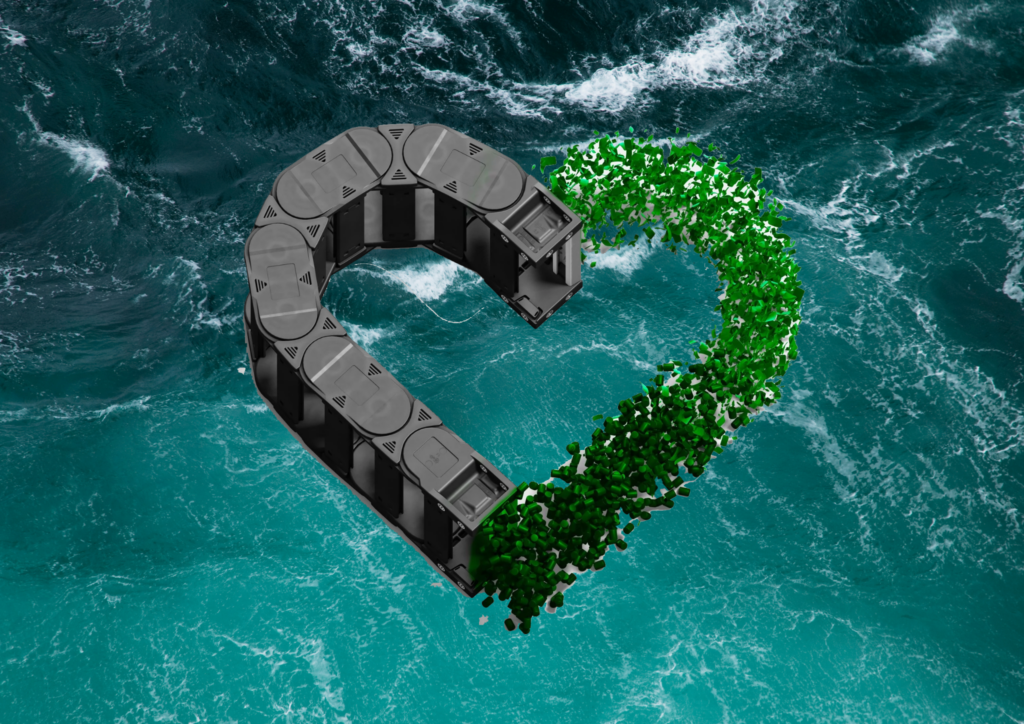Tackling the scourge of ocean plastic
03/10/2023

A rising wave of data shows just how serious ocean plastic pollution has become. igus is minimising waste plastic and helping remove plastic directly from the ocean
As a manufacturer of plastic engineering components, igus takes marine pollution very seriously and is engaged in several programmes to reduce plastic pollution.
More than 171 trillion pieces of plastic are estimated to be floating in the world’s oceans1, according to scientists at the 5 Gyres Institute. This is rate increase of more than tenfold since 2005, when the figure was 16 trillion pieces1. To put this in context, if every single person in the world – 8.1 billion people – threw a piece of plastic into the sea every day, starting now, it would take almost 60 years to reach the current level. This is a staggering amount, and societies cannot continue discarding plastic waste into the ocean.
Providing more evidence to support these arresting numbers, the Breaking the Plastic Wave report in 2020, published by the Pew Charitable Trusts and Systemiq with the support of University of Oxford, University of Leeds and others, shows four trajectories for microplastic leakage from now to 20402. Under the System Change scenario, the good news is that by 2050 “only 5 trillion tonnes” of microplastic will be present in the oceans. But under the do-nothing, Business As Usual scenario, with little or no intervention, this number balloons to a terrifying 28 trillion tonnes of microplastic.
“chainge” program and others aim to minimise plastic waste
All igus plastics are designed for long life, none are designed as single-use plastic (SUP) disposable components, so it is extremely unlikely that igus products make up part of this ocean waste – if so, it will form a tiny proportion compared with the SUPs. Also, when an igus part reaches the end of its life, there are end-of-life solutions arrange by igus to minimise waste. These are easy solutions for users. The igus “chainge” program allows any igus or third-party plastic e-chain to be returned to igus, where the material is regranulated and reused. Chain donors receive a voucher based on the weight of the chain that can be redeemed towards new igus products.
Cable jackets can now be recycled
A second igus program to help reduce ocean-bound plastics is the cable recycling program. Like the chainge program for e-chains, customers can return cables to igus UK that are then completely recycled. Typically, cable recycling retrieves the inner metal cables, while the plastic outer jacket is discarded. With this igus program, the plastic jacket is separated from the metal cores and both are recycled to be used for future production. The reclaimed metal is sold into the open market, and any profit used to plant trees, working with the Woodland Trust.
And that‘s not all:
- UK company Mura Technology, with investment from igus, has developed a process to chemically transform many forms of plastic waste into reusable oils. It will open its first plant in Teesside, UK, in November: https://www.igus.co.uk/info/hydroprs
- the igus:bike is a bicycle made (almost) entirely of plastic that aims to be 100% recycled plastic in the coming months. https://igus.bike/en/.
Will these actions solve the problem of 171 trillion – and growing – pieces of marine plastic? Not alone, but they help to prevent igus being part of this chronic problem, and they also give igus customers a way to meet their own sustainability goals.
